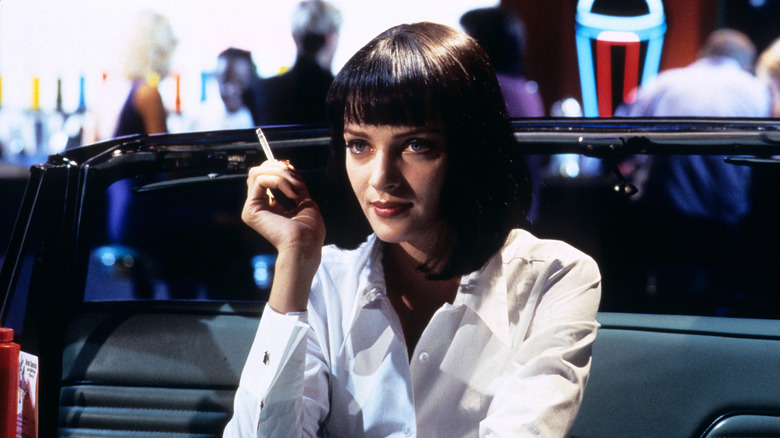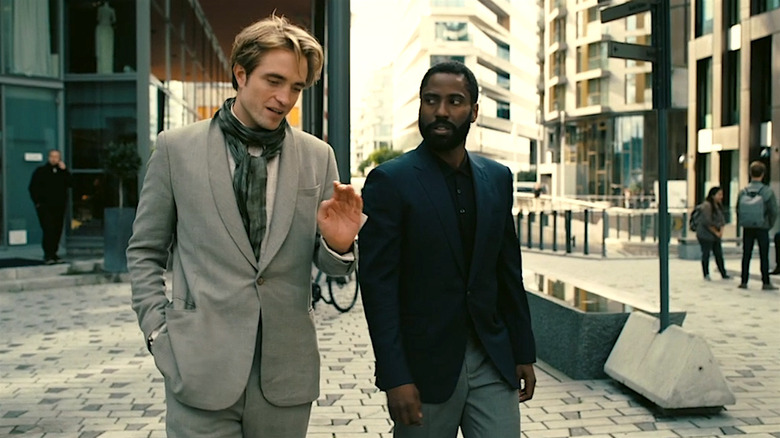Quentin Tarantino Needed Three Viewings To Fully Understand A Christopher Nolan Movie
If you have a favorite director, you can expect that your favorite director probably has a favorite director too. Enter Quentin Tarantino, who didn't come right out and say that his fellow Oscar winner Christopher Nolan is his favorite director, per se, but he had some serious praise for the British director's 2017 film "Dunkirk." The movie, which centers around the evacuation of Allied forces in World War II, utilizes little dialogue and relies on atmosphere and action as the soldiers depicted travel by plane, land, and sea, was, according to Tarantino, his seventh favorite movie of all time for a while, but shot to second place after some rewatches.
"I had an interesting experience with it the first couple of times," Tarantino told co-hosts Sean Fennessey and Chris Ryan on The Ringer's "Rewatchables" podcast. "The first time I saw it, I don't know what I was thinking the first time. I just dealt with the spectacle of it all. I couldn't deal with anything else but the spectacle of it all."
As Tarantino told them, the immersive way that Nolan shot the film really threw him during his first couple of viewings. "I liked the movie, but the spectacle almost numbed me to the experience," he recalled. "I don't think I felt anything emotional. I was awed by it. But I didn't know what I was awed by. ... It wasn't until the third time that I could see past the spectacle and into the people the story is about. I finally could see through the trees a little bit."
Finally, Tarantino figured out precisely how Nolan crafted the film and gained a new understanding of one of Nolan's masterpieces. "Oftentimes, you see a film where the style is about the adrenaline of it," Tarantino continued. "The style is an immersive experience, but by the third or fourth viewing you get past the style and you realize the magician's tricks. In the case of 'Dunkirk,' it rewards Nolan's efforts to see it more. There's a point, by mid movie, he can't do it wrong [...] It's a symphony. Nothing doesn't work."
Tarantino is right, but there's something ironic about his take on "Dunkirk" — because some of his movies are a bit tricky too.
One of Quentin Tarantino's most universally beloved films requires repeat viewings
The funny thing about Quentin Tarantino's take on "Dunkirk," while it's well-observed, can also absolutely apply to the film that many would call his signature movie. In 1994, audiences were blown away when Tarantino released "Pulp Fiction," a movie made up of violent vignettes that he wrote and directed which stars John Travolta, Samuel L. Jackson, Uma Thurman, Harvey Keitel, Tim Roth, Amanda Plummer, Ving Rhames, and Bruce Willis, just to name a few. What took many first-time viewers by surprise in the 1990s, though, is that "Pulp Fiction" is told through completely non-linear stories that ultimately all center around hitmen Vincent Vega (Travolta) and Jules Winnfield (Jackson), who spend a day getting into various scrapes in Los Angeles.
Even though the stories in "Pulp Fiction" do ultimately connect — which is also true of "Dunkirk," technically, because they're all involved in the same event — it can take a couple watches to figure out the order of everything. From Mia Wallace's (Thurman) accidental overdose and shocking resurrection to boxer Butch Coolidge (Willis) dealing with his girlfriend and debating whether or not he should throw a fight at the behest of powerful crime boss Marsellus Wallace (Rhames), everything is connected, but you definitely won't pick it all up on your first watch ... and the enduring mystery of what's in that prominent suitcase might never be fully solved. That's not to say Tarantino isn't also right about Christopher Nolan's film, but it's just interesting that one of his most critically adored films is so similar (and yet quite different when it comes to the content and topics).
Nearly all of Christopher Nolan's movies are a bit tough to understand at first, but they're well worth the effort
Quentin Tarantino definitely has a point about Christopher Nolan, though; almost all of the director's films benefit from rewatches, because they're all fairly dense and many of them utilize narrative frameworks that aren't exactly straightforward. Take one of his earliest films, "Memento," which stars Guy Pearce as a man experiencing short-term memory loss who has to keep notes on his body using tattoos to figure out what happened to him and who killed his wife; this movie demands that the audience solve the mystery alongside Pearce's Leonard, and you definitely can enjoy it even more on a second viewing once you get a grasp of the plot. "The Prestige" is a full-on mystery box movie that features one of the most baffling and incredible twists in recent cinematic history, and "Inception," another Nolan favorite, is "straightforward" in that it's told in a linear fashion, but it also constantly subverts audience expectations by forcing you to wonder if what you're seeing is a dream or reality.
Probably the most famously confusing Nolan movie, though, is his 2020 time-travel magnum opus "Tenet," where a mysterious man known only as The Protagonist (John David Washington) has to continuously move backwards through time to help figure out who orchestrates a massive attack in the present timeline. (That's sort of a shoddy explanation; "Tenet" is extraordinarily dense, and there are plenty of explainers, including one at Looper, that can help you make sense of this twisting, turning film.) Even Nolan's biopic of the father of the atomic bomb, J. Robert Oppenheimer (played by Oscar winner Cillian Murphy), doesn't utilize a particularly linear structure — frankly, the director's most "straightforward" films are the ones in his "Dark Knight" trilogy.
You can watch "Dunkirk" streaming on major platforms, where you can rent or buy Nolan's inventive film.


